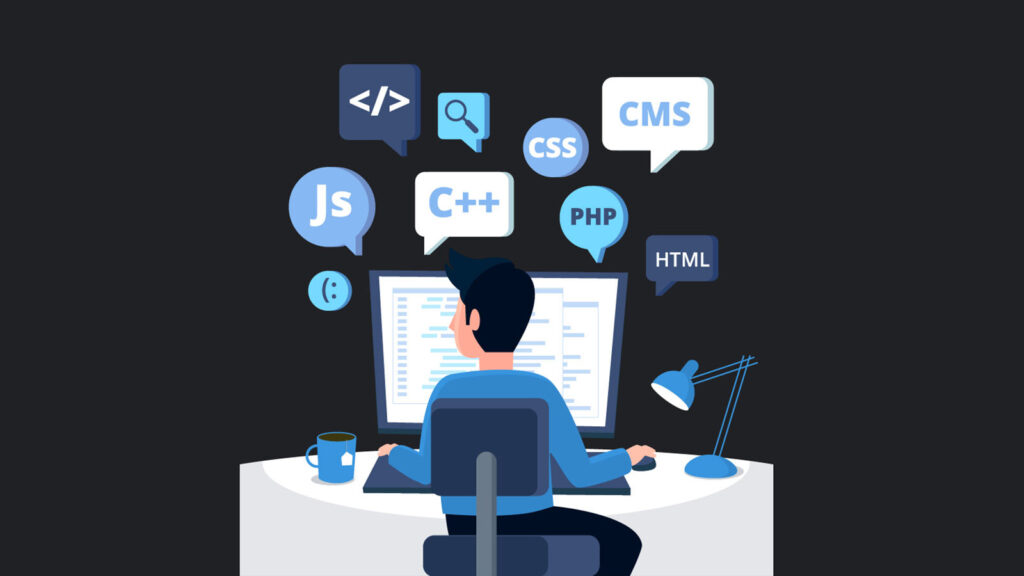Software engineers play a vital role in shaping the modern digital world. From building mobile apps to maintaining large-scale enterprise systems, software engineers create, design, and maintain the software that powers various industries.
Applications are designed, developed, tested, and maintained by software engineers. They write code, fix bugs, optimize performance, and collaborate with teams to build reliable software for various industries like tech, finance, healthcare, and cybersecurity.
If you’ve ever wondered, “what software engineers do,” this guide will give you a detailed answer.
What Software Engineers Do – Core Responsibilities!
Software engineers have many important tasks based on their skills and area of work. One of their main jobs is writing and testing code. They use programming languages like Python, Java, C++, or JavaScript to create clean, efficient, and bug-free programs. Writing good code helps ensure that software runs smoothly without errors.

Another key responsibility is designing and developing applications. Engineers create software by thinking about how well it will perform, how easily it can grow, and how useful it will be for users. They also focus on database management, where they handle and organize data, making sure it is stored correctly and works efficiently. Keeping data safe and easy to access is very important in software development.
Software engineers also work closely with different teams. They collaborate with designers, product managers, and other engineers to come up with new and creative solutions. Good teamwork helps in building better software.
Types of Software Engineers!
There are various specializations within software engineering, each focusing on a different aspect of software development:
- Front-End Engineers: Work on the user interface (UI) and user experience (UX), ensuring the application is visually appealing and easy to use.
- Back-End Engineers: Focus on server-side development, managing databases, APIs, and logic behind applications.
- Full-Stack Engineers: Handle both front-end and back-end development, creating complete applications.
- Mobile App Developers: Specialize in building apps for iOS and Android using Swift, Kotlin, or Flutter.
- Embedded Systems Engineers: Develop software that interacts with hardware, such as smart devices and IoT applications.
- AI/ML Engineers: Work on artificial intelligence and machine learning projects, developing algorithms and data models.
Essential Tools Used by Software Engineers!
1. Integrated Development Environments (IDEs):
Software engineers use IDEs like Visual Studio Code, IntelliJ IDEA, and Eclipse to write, debug, and test code efficiently. These tools enhance productivity with features like code completion and error detection.
2. Version Control Systems:
Git and platforms like GitHub, GitLab, and Bitbucket help software engineers track changes, collaborate with teams, and manage code efficiently.
3. Project Management Tools:
Engineers use tools like Jira, Trello, and Asana to manage tasks, track progress, and collaborate with teams effectively.
4. Testing and Debugging Tools:
Testing frameworks like JUnit, Selenium, and Postman help software engineers ensure software reliability. Debugging tools like Chrome DevTools and GDB assist in identifying and fixing issues.
5. Containerization and Cloud Services:
Software engineers use Docker and Kubernetes for containerization, enabling scalable application deployment. Cloud platforms like AWS, Google Cloud, and Azure provide robust infrastructure for hosting applications.
The Impact of Software Engineers on Society!
Software engineers have revolutionized the way people live, work, and communicate. From social media platforms to online banking, almost every aspect of modern life depends on software-driven solutions. Engineers develop healthcare applications that save lives, educational platforms that improve learning, and financial technology that enables secure transactions. Without their expertise, businesses and individuals would struggle to keep up with the fast-paced digital world.
Additionally, software engineers are instrumental in addressing global challenges. They create systems that monitor climate change, optimize energy consumption, and support scientific research. Their innovations drive automation, enhance productivity, and improve daily life. As technology advances, software engineers will continue to shape the future, making the digital landscape more efficient, secure, and user-friendly.
Read: What Free Software Improved Computer Performance The Most – Discover The Best Software!
Skills Required to Become a Software Engineer!
To succeed in software engineering, individuals need a strong mix of technical and soft skills:
- Programming Languages: Proficiency in Python, Java, JavaScript, C++, or other languages.
- Problem-Solving & Algorithms: Strong understanding of data structures and algorithms.
- Frameworks & Tools: Knowledge of React, Node.js, Docker, Kubernetes, etc.
- Version Control: Knowledge of GitHub and Git for teamwork in development.
- Communication & Teamwork: Ability to work with cross-functional teams and articulate technical concepts.
Software Engineer Salaries Around the World!
One of the highest-paying occupations is software engineering, which is in high demand. Salaries vary based on experience and location:
- India: Entry-level: ₹2.8L – ₹3.5L; Experienced: ₹10L+
- USA: Entry-level: $60,000 – $80,000; Senior: $120,000 – $150,000+
- Europe: €40,000 – €120,000 based on experience
How to Become a Software Engineer?
1. Educational Background:
A degree in computer science, software engineering, or a related field provides foundational knowledge. However, self-taught programmers and coding bootcamp graduates can also enter the industry.
2. Learning Programming Languages:
Software engineers must master programming languages like Python, Java, JavaScript, or C++. Learning multiple languages enhances problem-solving abilities and increases job opportunities.
3. Gaining Practical Experience:
Building projects, contributing to open-source software, and participating in internships help aspiring engineers develop real-world skills. Hands-on experience is crucial for career growth.
4. Developing Problem-Solving Skills:
Software engineers must think logically and solve complex problems efficiently. Participating in coding challenges, such as LeetCode and CodeWars, helps improve problem-solving skills.
5. Continuous Learning:
Technology evolves rapidly, so software engineers must stay updated with the latest tools, frameworks, and programming trends. Online courses, workshops, and certifications can enhance expertise.
How to Become a Software Engineer?
Becoming a software engineer can be accomplished in a variety of ways. One common path is through formal education, where many software engineers earn a degree in Computer Science or a related field. A college degree provides a strong foundation in programming, algorithms, and computer systems, which can be helpful when applying for jobs.

However, a degree is not the only way to enter the field. Many people learn software engineering through online courses and bootcamps. Websites like Udemy, Coursera, and freeCodeCamp offer courses that teach coding and software development skills. These courses are often more affordable and flexible than a traditional degree, allowing people to learn at their own pace.
Another effective way to become a software engineer is through hands-on projects. By building real-world applications, people can gain practical experience and showcase their skills to potential employers. Many software engineers also gain experience through internships, freelance work, or open-source contributions. Internships provide valuable industry experience, while freelance projects help develop problem-solving skills.
The Future of Software Engineering!
The future of software engineering looks promising with advancements in AI, cloud computing, and blockchain technology. Trends shaping the industry include:
- Remote Work & Global Collaboration: Companies increasingly hire engineers from different parts of the world.
- AI & Automation: AI is streamlining development processes, but engineers remain crucial for innovation.
- Cybersecurity & Data Privacy: Growing demand for security-focused software engineers.
Read: How To Update Mac Os X Software – A Complete Guide!
FAQs:
1. What do software engineers do daily?
Software engineers write and test code, fix bugs, collaborate with teams, and optimize software performance. They also work on security, databases, and software design to ensure smooth application functionality.
2. What skills are needed to become a software engineer?
Key skills include proficiency in programming languages (Python, Java, C++), problem-solving, knowledge of databases, cloud computing, version control (Git), and software development methodologies like Agile.
3. Do software engineers only write code?
No, software engineers also design software architecture, manage databases, conduct testing, collaborate with teams, and maintain system security. Some may focus more on planning and optimizing software rather than coding daily.
4. What industries hire software engineers?
Software engineers work in technology, finance, healthcare, e-commerce, gaming, cybersecurity, and government sectors. Almost every industry needs software engineers to develop and maintain digital systems.
5. Is software engineering a good career in the future?
Yes, software engineering is in high demand globally, with excellent job growth and competitive salaries. Emerging fields like AI, cloud computing, and cybersecurity ensure long-term career opportunities.
Conclusion:
Software engineering is an exciting, high-demand career with excellent growth opportunities. Whether you’re interested in web development, AI, or cybersecurity, software engineering offers diverse career paths. Now that you know what software engineers do, you can start your journey by learning the necessary skills and gaining hands-on experience.
Also Read:
- What Are Software Requirements Specifications – Dive In Now To Explore Everything You Need To Know!
- How To List All Technologies And Software A Site Sugins – Click Below To Get Started!
- Do I Need A Virus Software In Chromebook – Click Here To Learn More!
- What Is Cam Cad Software – Start Exploring The Best Software Solutions Today!
- What Is Sas Software? – A Complete Guide To Understanding Sas!










